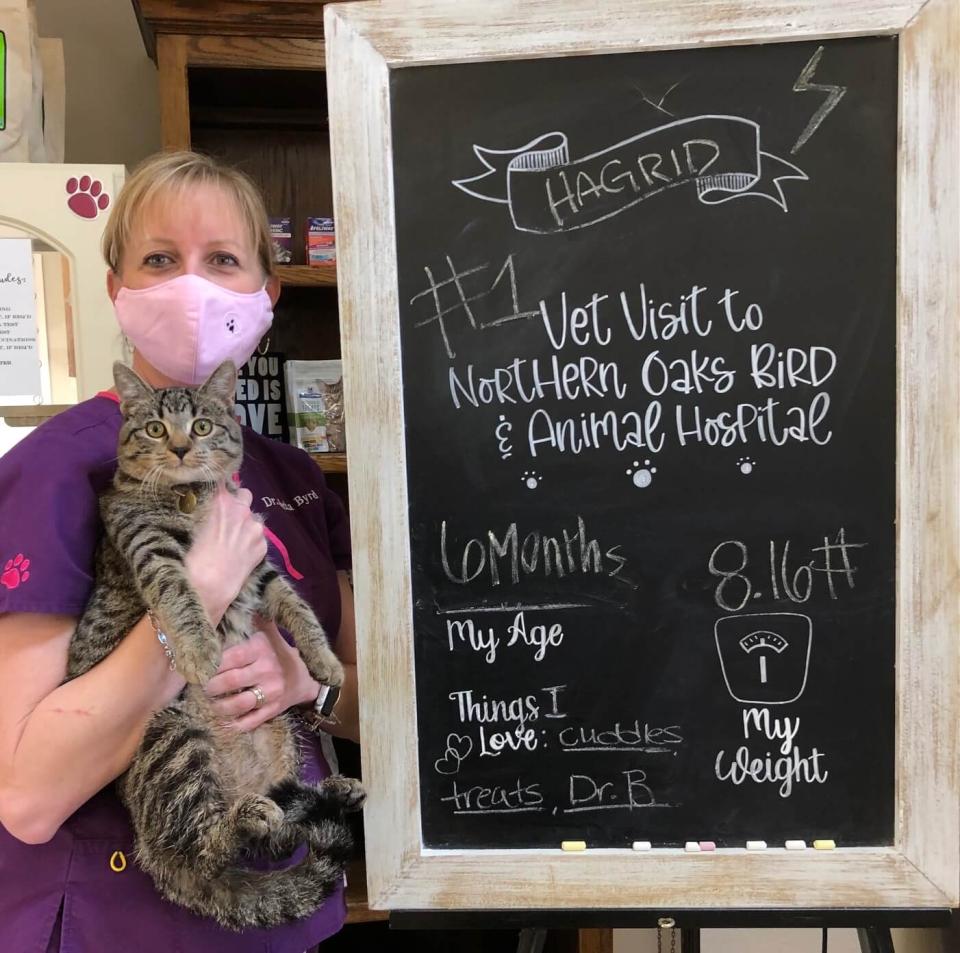
Preventive Care and Examinations
At our hospitals, we understand that prevention is truly the best medicine where the health and wellness of your cat is concerned. This is why we offer our cat patients and their human counterparts a comprehensive array of cat preventive care services that promote the health, wellness, and longevity of your cat. We believe the most important part of any care program is the examination so whether indoors or out, it is essential that your cat be examined regularly to detect any underlying conditions. As a Certified Cat Friendly Practice, your cat will always have the least stressful experience possible including Feliway Pheromone diffusers and soft materials for any required holding. We even offer pre appointment medication, by request, if your cat is a bit of a scaredy cat, to help alleviate the anxiety. Every examination also includes a complimentary nail trim.
Cat preventive care consists of:
- Annual or Semi-Annual Physical Examination
- Blood and urine analysis
- Ongoing Health and Wellness Education
- Periodic At-Home Monitoring
The focus of a preventive care program is to ensure that your cat is receiving everything they need to live a healthy life including proper nutrition, good hygiene, and adequate stimulation, as well as early detection of any illness or disease that may be developing. In the fight against various cat diseases, early detection makes a significant difference in the scope and effectiveness of treatment. Many people forget that even indoor cats develop cardiac, kidney and dental issues.
Most cat diseases are much easier to treat in the early stages, while some diseases can actually reach a point where treatment is no longer an option. Unfortunately, cats are so good at hiding signs and symptoms of disease that, by the time symptoms become obvious, it may be too late. This is why regular exams are critically important.
Semi-Annual Wellness Exams For Your Cat
A semi-annual wellness examination should be performed every six months. The physical examination is a comprehensive assessment of your cat's health. We will review various aspects of your cat's health, including:
- Vaccination status
- Parasite control - to include both internal and external parasites
- Dental health
- Nutrition
- Ears and eyes
- Internal organs
- Behavior
- Coat and skin
- Bloodwork to help assess metabolic function
Based on the findings, we will discuss any concerns, make recommendations and work with you to keep your cat as healthy as possible.
Cat Cancer Detection
Cancer is among the most frightening and painful diagnosis a cat owner can hear. It is also a disease that stands a better chance of being defeated when detected early.
Because most signs of illness in cats remain subtle until they are in a more serious condition, it is very important to have a thorough physical examination performed on your cat on a regular basis.
Integrative Medicine For Cats
Preventive care for cats also includes various fields of integrative medicine. Integrative medicine consists of alternative practices that enhance or enrich standard or classical preventive and treatment-based protocols. Some of the many forms of integrative medicine that promote cat health include:
- Acupuncture
- Supplements/Nutraceuticals
- Laser Therapy
Integrative medicine can be very effective in promoting cat health when used in conjunction with other therapies or treatments. Ask if integrative medicine can help your cat.
Cat Dentistry
One of the most overlooked and most important facets of preventive care for cats is dentistry. Cats do not tell you when they have oral pain or discomfort. In general, by four years of age, most cats have developed some dental or gingival disease that will require veterinary intervention. A thorough examination requires anesthesia and dental x-rays.
The majority of dental disease in cats lies underneath the gum line. For this reason, x-rays are required to identify any disease that may be present in the tooth and the root of the tooth which may be a source of chronic pain. Some of the causes of dental disease and discomfort include:
- Gum Disease
- Malocclusion
- Tooth Loss
- Mouth Sores and Ulcers
- Gingivitis
- Periodontal Disease
A thorough cat teeth cleaning is something you should have performed every 6-12 months, but regular brushing can be performed at home. We can assist you in learning how to brush your cat's teeth. Many cats will tolerate daily teeth brushing if done in a gentle and respectful manner. You can also help facilitate excellent cat health by providing toys and treats formulated to help strengthen and/or clean your cat's teeth and gums.
For more information on cat dentistry, visit our cat dental care page.
Flea & Tick Prevention For Cats
No insects are as troublesome to you and your cat as fleas and ticks. Fleas can cause severe skin irritation and can infest your home if you do not have a good preventive plan. While less common than fleas, ticks can transmit dangerous and even deadly diseases. Both indoor and outdoor cats are at risk for fleas and ticks, as these parasites can thrive in almost all geographic locations.
Flea and tick prevention is a cornerstone of comprehensive preventive care for cats. It is important to be aware that there are numerous products on the market to avoid. Every year, our veterinarians review all available flea and tick products to ensure that our recommendations are as up to date as possible. Our considerations include safety, effectiveness, and cost. Based on these factors we will work with you to customize a parasite prevention plan for your pets and family. As part of the preventive care for your cat, we will help you choose the safest, most effective parasite products.
Cat Nutrition
Raising a healthy cat depends heavily on the type and amount of food they consume on a daily basis. Low-quality cat food and treats negatively affect many aspects of your cat's health. Just because a food is expensive or "boutique" with excellent marketing does not mean it is a nutritious choice. Cat obesity is the most common health problem we see in our otherwise healthy cat patients. Developing a nutritional plan from an early age which includes a diet selection, a feeding plan and exercise plan is the best way to avoid cat obesity. Cats will have different nutritional requirements during each stage of their lives which include:
- Kittens
- Adult Cats
- Senior Cats
- In addition, there are health conditions which will require special diets
Cat Vaccinations
Vaccinations are a fundamentally essential component of cat care. They consist of a series of immunizations given to your cat as a kitten, and then boosters given periodically throughout your cat's lifetime. Vaccinations help prevent and fight various serious, even potentially fatal diseases that cats are at risk of contracting. They also help prevent the spread of diseases between cats, as well as to human beings. Rabies vaccination is required by law in Texas, even for indoor cats.
Schedule An Appointment To Start a Preventive Care Regimen For Your Cat
We are a dedicated, knowledgeable, and passionate group of veterinarians who absolutely love both our kitty patients and their human counterparts. We are here to provide comprehensive and compassionate preventive cat care services, and to help you learn how to provide the best care in every way. Contact us to discuss a preventive cat care regimen for your cat, and to schedule an appointment with one of our veterinarians.
Cat Preventative Care - How We Ensure a Long and Happy Life for Your Cat
Dr. Becka Byrd
Northern Oaks Bird and Animal Hospital
Hi, I'm Dr. Becka Byrd, and I'm here from Heritage Oaks and Northern Oaks Bird Animal Hospitals. I want to talk to you a little bit about cat preventative care. Cat preventative care is doing things for your kitty to keep them from getting sick and minimize the amount of care that must be done down the road. It helps expand their life so they can have a long healthy life with you. The types of things we look at as veterinarians are nutrition and weight management, keeping your cat a healthy weight, and making sure your kitty is on a healthy diet. There are a lot of trendy diets out there and a lot of misinformation on the internet. The best source of information for your cat's nutrition is your veterinarian. We have training in this to help you make a guided choice on what's nutritionally sound and not just trendy ingredients.
Regarding vaccinations, we can assess your cat's lifestyle and make recommendations based on what your cat does, what it's exposed to, what the law requires, and also what its risks are. Then we look at dental care. That's one of the most neglected areas in cat health. Often, we'll look in a cat's mouth and realize this poor cat has been living with tremendous pain and needs extensive dental work, which could have been prevented by doing annual preventative and aesthetic dental care. Then these cats will keep their teeth their whole life and be happy and healthy. Regarding spaying and neutering, unspayed and unneutered cats have very unwanted behaviors, such as marking and yowling in the middle of the night. They are also extremely prone to breast cancer. So these guys will fare much better by being spayed and neutered at a very young age. It does not inhibit bone growth, size, or maturity, and it eliminates many problems we don't want to worry about.
We also want to prevent fleas and ticks because they carry diseases for cats. One of the things we see in cats that have had a lot of fleas is a disease called mycoplasma, which causes severe anemia in cats and can make them very ill. Other things we look at are kitties that get arthritis as they get older. These signs can be very subtle. Many people don't recognize when their cat is not as active, not grooming quite as well, doesn't want to be touched the way they used to, and sleeps more. These are all subtle signs of arthritis. Moreover, cats that become matted, which used to be very good coat keepers, might have arthritic changes, but there are some really good and revolutionary treatments for arthritis in cats now. So ask one of us if you're concerned about your cat or if you feel they might have signs of something going on. For our senior cats, we always want to do some lab work because they really have to lose a tremendous amount of organ function before we see signs of it. Kidneys are one of the number one things in cats that we need to assess to ensure they're healthy. If you have questions about anything regarding your pet, the best way to find out is to ask your veterinarian. Thank you for joining me today.
If you still have other questions and you'd like to reach out to us, you can call us directly at (210) 496-1315, or you can email us at [email protected]. But please do reach out, and we'll get back to you as fast as we can. Don't forget to follow us on social media https://www.facebook.com/northernoaksvet/ #




